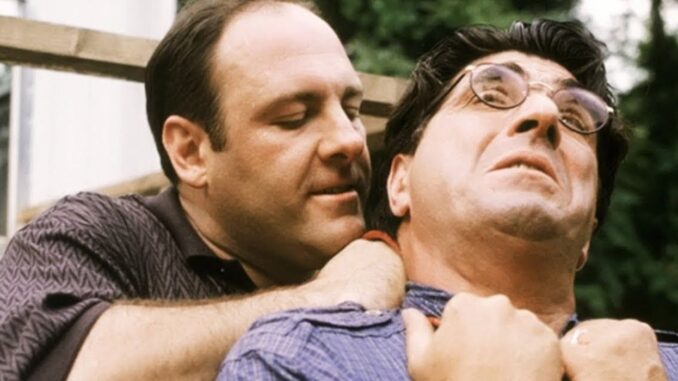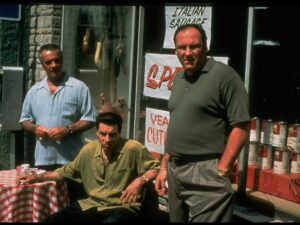
When The Sopranos premiered on HBO in 1999, it was an instant hit that changed television forever. Its incredible quality has been credited with sparking a new golden age for TV, and it continues to rank among the greatest and most influential shows of all time. More than this, however, The Sopranos managed to be a hit while breaking all the rules of the gangster genre and redefining what a crime story could be.
Definitions and categories can vary, but the gangster movie has arguably existed since Underworld was released in 1927. In the decades after, films like The Godfather and Goodfellas thrilled audiences and set the standard for what gangster stories should be. Full of action, stylish characters, and glamorous settings, these crime movies romanticize their subjects in a way that The Sopranos would later reject.
The Godfather and Other Gangster Classics Glamorized Crime

Francis Ford Coppola’s The Godfather set the standard for modern gangster films in 1972 and later hits like Martin Scorcese’s Goodfellas and Casino built on this legacy. While all great movies and each unique in their own way, they do have one thing in common. They all tend to portray their characters as stylish and present their lifestyle as exciting and full of charm.
From the grand parties and pressed suits of the Corleone’s to the fashion and music of Sam Rothstein’s Tangiers Casino, these movies left many fans, at least partly, admiring and envying their protagonists. Even as violence and chaos swirled around them, the gangsters of these classic movies tended to maintain a sense of class and coolness that viewers couldn’t help but be drawn to.
Even after all their actions have caught up to them, and they’ve fallen from grace, many characters from these gangster films exhibit only nostalgia for the past. Henry Hill finds himself wishing he could return to his life of crime after going into the Witness Protection Program. Sam Rothstein laments how Las Vegas has changed, becoming more crude and low-class since the mob’s withdrawal from the city.
Further, these films often portrayed their gangsters as tragic heroes or necessary evils in a complex world. The Corleone’s in The Godfather are depicted as holding back the evils of the drug trade and Michael is depicted as a good man who reluctantly takes over his family to save his loved ones. In Goodfellas, Henry Hill presents the mafia as an organization that can keep order in the criminal underworld where people can’t call the police for help.
For nearly a hundred years, gangster films tended to follow this formula, telling compelling stories that glamorized a life of crime. Then The Sopranos premiered and everything changed.
The Sopranos Broke New Ground By Appreciating the Finer Details
The Sopranos dramatically departed from the traditional approach to gangster stories from the very beginning of the series. Most notably, it changed the setting from the traditional locations of New York, Chicago, or Las Vegas to the far less exciting New Jersey suburbs. Creator David Chase even made it a point to have the intro feature protagonist Tony Soprano driving away from New York, with major landmarks in his car’s mirrors, to emphasize that the show is not focused on the famous city. Further, the primary recurring locales of The Sopranos were Tony’s large but still ordinary house, the backroom of a deli and butcher shop, and Silvio Dante’s sleazy strip club. These were a far cry from the bright and flashy casinos and restaurants of past stories.
The main characters, too, were rarely the classy or clever mobsters of Scorcese or Coppola films. Tony is depicted as chronically depressed, often moping around his house in his underwear. Many of the show’s plots also originated from him making poor decisions because of his anger issues or his compulsive gambling. Paulie Gualtieri became a fan favorite for the ridiculous things he often said because of his ignorance. Chris Moltisanti spends the series spiraling deeper into drug addiction and self-destruction. In the end, none of the characters portray a life of crime as something to aspire to.
The Sopranos further went out of its way to show the victims of crimes in greater detail than many past shows and movies. While gangster films tend to focus on the violence between competing gangs and imply that those hurt know what they signed up for, The Sopranos made clear that there are no victimless crimes and that the characters leave destruction and despair in their wake. From the father of Meadow’s friend who is left ruined after he gets himself indebted to Tony to innocent bystanders who are occasionally threatened, hurt, or even killed because they saw too much, it’s made clear that crime is not glorious or thrilling for those caught up in it.
Finally, many characters experience arcs that explicitly involve them realizing they’re not as rich or stylish as they think. When Tony tries to make friends with his rich doctor neighbor, he quickly realizes that he’s only invited around as a novelty and that he’s not seen as a peer. Chris’ regular attempts to break into the movie business often end with him seeing that he’s simply not a part of that world. When A.J. dates a girl with a wealthy father, he’s confronted with the fact that his family isn’t nearly as rich or powerful as he thought. Over and over, both the audience and the characters are shown that the gangster life isn’t what the movies make it out to be.
The Sopranos Deliberately Subverted the Tropes of the Genre

It’s no accident that The Sopranos broke long-established rules of the genre. The show regularly featured meta moments that hinted to viewers that it was intentionally commenting on gangster movies and fiction in general.
Characters regularly reference old crime movies, talking about their favorite scenes and comparing their situations to those in the films. Real world actors and directors, including Jon Favreau and Martin Scorsese, have cameos as themselves. As discussed above, Chris Moltisanti is obsessed with movies and constantly trying to break into the business. All of this hints to fans that The Sopranos is a self-aware show and trying to comment on its own genre and predecessors.
As if that wasn’t enough, Dr. Melfi’s ex-husband even makes things more explicit early in the series. During a conversation about the portrayal of Italian-Americans in media, he complains that movies and shows about gangsters “give these sociopaths the tragic grandeur of Al Pacino.” This quote arguably sums up the trend that The Sopranos pushed back against.
The Sopranos quickly became known as more than just a crime story. It was a smart show, full of discussions on philosophy, psychology, religion, and politics. It’s not surprising then, that it also sought to discuss fiction itself, and the history of its own genre.
Tony Soprano and the Banality of Evil

In subverting the classic tropes of its genre, The Sopranos made a powerful point about the nature of crime and joined a deeper philosophical discussion. The academic and writer Hannah Arendt coined the phrase “the banality of evil” to explain how monstrous individuals rarely look like mustache-twirling villains from movies. Instead, they’re often boring people who do horrible things without passion or a flair for the dramatic. The Sopranos gave fans just such a cast of characters.
David Chase has stated that he began The Sopranos with the idea of showing a mob boss who has to deal with very normal problems that many men his age have to confront, from a struggling marriage to raising kids. In short, Chase portrayed a gangster whose life was, in many ways, banal and ordinary. While he does terrible things and engages in dangerous exploits, it never brings his life the glamor of the movies he enjoys.
It speaks to the remarkable writing of The Sopranos that the show could deliberately portray gangsters as less than glamorous while still thrilling viewers. The exploration of each character’s psychology, the dynamics of their relationships, and themes like generational trauma and the nature of fiction made the series powerful and engrossing without the need for flashy clothes or stylish locations.
The Sopranos is still remembered as one of the greatest HBO series of all and one of the best TV shows ever produced. It earned these accolades thanks to great writing and incredible performances by everyone involved. Even more impressive is that it accomplished all this while breaking long-established rules for what gangster stories should be and redefining the genre. For these reasons, it’s still required viewing for fans of the genre and students of film.
